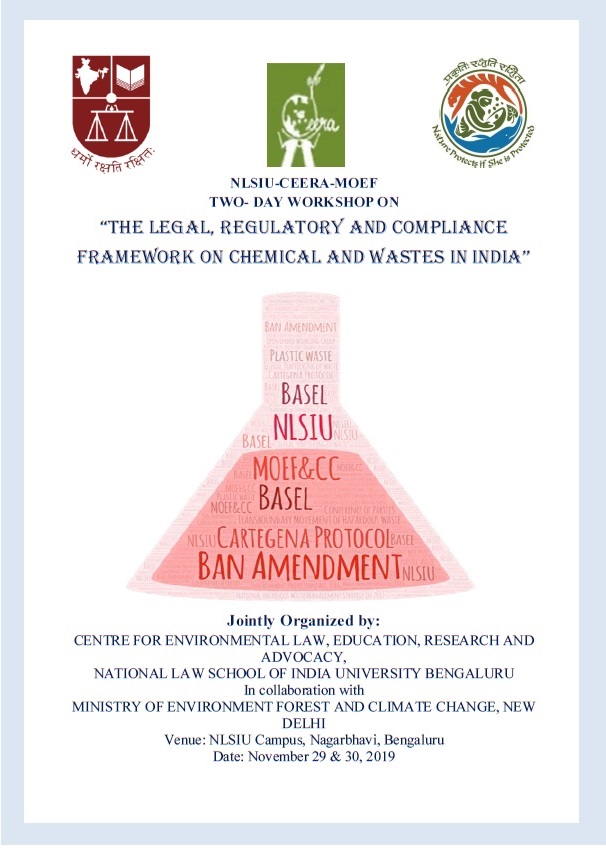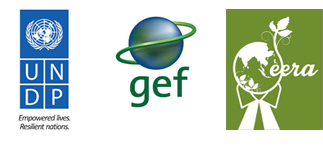LEGAL, REGULATORY AND COMPLIANCE FRAMEWORK ON CHEMICAL AND WASTES IN INDIA – NOVEMBER, 29 & 30, 2019

The use of chemicals is indispensable for the growth of any economy in the present times. It is the mainstay of several sections of the economy and contributes largely for the growth of several sectors by providing raw materials for a number of industries, including textile, paper, paint, soap and detergent, pharmaceutical, bulk drugs and formulations, agrochemicals such as insecticides, pesticides, fertilisers etc. Besides use of imported chemicals in different industries, the chemical sector is an industry in its own right producing a wide range of products such as inorganic chemicals, synthetic organic chemicals like drugs and pharmaceuticals, dyes and intermediates, pigments, fine and specialty chemicals, chlor-alkali, pesticides, colorants and alcohol based chemicals, etc. India ranks sixth in the world in the production of chemicals and fourth in the production of agro-chemicals. India accounts for 16 per cent of the dye stuff and dye intermediates and is a global supplier of dyes. Excluding pharmaceutical products, the chemical industry ranks 14th in global exports, employs more than 2 million people and its value is expected to rise to 304 billion dollars by 2025.
Spread across small, medium and large scale units, the Indian chemical industry is one of the most diversified industrial sectors covering more than 70,000 commercial products. Some chemical industries are knowledge based and small, others are large and require substantial investment of capital, uninterrupted power and other enhanced infrastructure for their functioning and production. A careful perusal of statistics on production, import, export and uses, indicates that the major hub of chemical industries are mostly concentrated in Gujarat and Maharashtra while some others are located in Andhra Pradesh, Tamil Nadu, Karnataka and West Bengal. The areas that contribute largely in terms of consumption are located in Uttar Pradesh, Punjab and Haryana especially with respect to agrochemicals i.e. fertilizers and pesticides. But consumption of chemicals as a whole is low in India in comparison to advanced countries. The per capita consumption of chemicals is about one tenth of the world average which indicates that the potential demand is yet to be realized.
The sheer magnitude of the Indian chemical industry, the wide spectrum of products manufactured, the allied and dependent sectors using chemicals, the emergence of new chemical products with each passing day and the impact that the industry has on the safety and livelihood of the persons employed in the sector and those working in close contact with chemicals, makes it incumbent on the state to devise a regulatory mechanism for the chemical industry. In keeping with the requirements of the industry and the challenges it can pose, especially in terms of environmental and health risks, India has a comprehensive legislative framework for the management of chemicals, many of which have been formulated in response to its international obligations under the different multilateral environmental agreements that on chemicals and waste that India has ratified. Some of the significant chemical and waste MEAs to which India is a party include the Basel Convention on the Control of Transboundary Movement of Hazardous Wastes and their Disposal, the Rotterdam Convention on the Prior Informed Consent Procedure for certain Hazardous Chemicals and Pesticides in International Trade, the Stockholm Convention on Persistent Organic Pollutants, the Minamata Convention on Mercury and the Strategic Approach on International Chemicals Management.
India has a robust regulatory mechanism for addressing chemical management that targets all stages of chemical production, use and handling. Regulations have been enacted for the entire life cycle of chemicals, starting from manufacture, storage, use, handling, transportation, import and export, recycling, disposal and waste management, consumer interest for using chemicals and the protection of the environment and public health that can be grouped under four heads: laws on chemical management and handling, chemical use and environmental management, chemical use, disaster and emergency management and special categories of chemicals. Owing to the multiplicity of rules, regulations and standards, and cross-sectoral nature of chemical management several pieces of legislation, regulations or standards in the country address chemicals in different ways. For instance, different legal instruments address issues at different stages of chemical life cycle such as classification and labelling of chemicals/products, registration of products, permits (e.g. for discharge), licences (e.g. to operate), reporting requirements, inspections, information to be provided to workers and/or the public etc. With the wide assortment of legal instruments, multiple stakeholders are involved in the management and handling of chemicals and waste generated. Different stakeholders are assigned varied roles and responsibilities under the different legislation based on the objective of the legislation, and the kind of chemical targeted, its use category and the phase of the life cycle of the chemical targeted. The same goes for the different Ministries involved in the handling and management of chemicals. While the Ministry of Environment, Forest and Climate Change is responsible for matters related to international conventions, the national negotiations, rules and regulations for their manufacture, storage, import, handling and management of chemical waste, monitoring post-accident response to chemical accidents assisted by other Ministries and Department, the Department of Chemicals and Petrochemicals is responsible for formulation and implementation of policy and programmes for achieving growth and development of the chemical and petrochemical sectors in the country. While the Ministry of Agriculture is responsible for reviewing the use of insecticides and hazardous chemicals and verifying claims made by importers or the manufacturer, as regards the use and efficacy of insecticides and pesticides and their impact on the safety to human beings and animals, the Directorate General of Commercial Intelligence & Statistics, Ministry of Commerce & Industry maintains data on the import and exports of chemicals. With the wide variety of roles assigned to different bodies involved in the chemical sector, the need for convergence between the stakeholders becomes imperative.
Besides, regulatory mechanisms, there are a number of non-regulatory mechanisms that play a very vital role in the management of chemicals in India. These include initiatives and voluntary actions taken by industrial associations in setting standards for management of an organisation’s environmental impacts, product certification and issuance of licenses to abate harmful impact on the environment and adoption of clean technologies and improvement in management practices under CREP (Corporate Responsibility for Environmental Protection) Programmes formulated by the Central Pollution Control Board through industry-specific interaction and meetings.
While these initiatives are noteworthy, a perusal of the different laws and regulations on chemical and waste management reflects some glaring incongruity and non-uniformity in the list of hazardous chemicals addressed by different legislation for different aspects of chemical handling. Hazardous chemicals and wastes and properties that they must exhibit for their explosivity, flammability, toxicity and corrosivity differ under the different rules in the absence of harmonized definitions. Moreover, most of the Chemical and Waste related MEA’s to which India is a party and their labelling standards for chemicals and identification of chemicals and chemical compounds do not match the Indian labelling and classification standards. Little effort has been taken in the large scale storage of chemicals, containment and non-containment of explosives. Limitation of inspectors in the different Departments makes it difficult to gauge the effectiveness of some of the legislations in the sector and lack of public awareness on chemical safety seems to be another major problem ailing the chemical sector in the country. The voluntary measures and initiatives taken up by industrial associations work effectively in larger industries that have more resources and manpower to implement the measures and have little impact on the small scale industries. In handling chemical wastes, few states across the country have toxic substance disposal facilities and handling of complex chemicals continues to be a concern. The chemical industries often grapple with a number of problems some of which include accidental release or spillage of chemicals, inadequate pollution abatement measures, ineffective coordination between government and regulatory agencies, use of obsolete and outdated technology that does not ensure waste minimisation/cleaner production, groundwater and soil contamination, lack of formal training of staff on formulation, handling, chemicals poisoning, etc. Most of these problems land the industries on the wrong side of law.
With the wide array of issues that the chemical sector presents, the multiple bodies involved in its day to day functioning and the far reaching consequences that can result if chemicals are not used, managed, stored, transported and disposed of appropriately, the legal, regulatory and compliance framework on chemicals and wastes in India presents itself as a subject that needs to be extensively deliberated upon, With this in view, the Centre for Environmental Law, Education, Research and Advocacy is organizing a Two- Day Workshop to discuss, deliberate and create awareness about the subject. The objective of the Workshop is to build capacity and awareness regarding the legal, regulatory and compliance framework on Chemical & Wastes in India, stemming from the obligations under the various C&W MEAs that the country is a party to.

